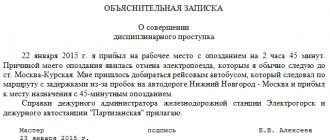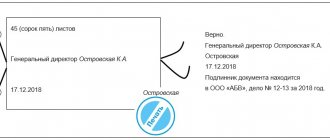Reasons for use
Grounds for disciplinary action: for the punishment to be considered legal, the violation must be recorded on paper or other media.
This medium forms the basis for further investigation.
If an employee decides to appeal the penalty applied to him in court, in the absence of a document confirming the violation identified, the employer will have nothing to present as evidence of the validity of the measures taken, and this may lead to the removal of the penalty.
Acts that violate any rules or ignore duties are called misdemeanors.
A disciplinary offense is considered to be failure to perform or improper performance by an employee of his duties..
All additional documentation that the employee needs to comply with must be promptly familiarized with signature. Punishment for failure to comply with the provisions of a document, familiarization with which does not have documentary evidence, is illegal.
It is also necessary to familiarize yourself with the disciplinary action taken by the employee.
Types of liability
- If a serviceman violates administrative regulations or commits a crime, the provisions of the Criminal or Administrative Codes will apply to him. That is, he will bear criminal or administrative liability according to the general rules.
- For violation of the regulations, a military man may be subject to disciplinary action. In this case, the offense may contain elements of an administrative offense. However, when imposing sanctions, the norms will not be the Administrative Code, but the 76th Law.
Kinds
For the vast majority of employees, penalties can be of the following types :
- remark (clause 1, part 1, article 192 of the Labor Code of the Russian Federation);
- reprimand (clause 2, part 1, article 192 of the Labor Code of the Russian Federation);
- dismissal (clause 3, part 1, article 192 of the Labor Code of the Russian Federation, clauses 5, 6, 10, part 1, article 81 of the Labor Code of the Russian Federation).
Can an enterprise impose additional disciplinary sanctions? The answer is clear - no.
The choice of the imposed punishment must be made based on the circumstances of the incident and the weight of the consequences that arose.
All penalties are imposed by publishing a written order to this effect . There is no oral form for this procedure. Administrative sanctions and disciplinary sanctions have some differences.
Differences between administrative (A) and disciplinary (D) sanctions:
| A | D | |
| Law | Code of Administrative Offenses of the Russian Federation | Labor Code of the Russian Federation |
| Attractive faces | Officials, persons authorized by the state | Heads of organizations |
| Who can be involved | The circle is not limited | Your employees |
| Consequences of repeat offense | Up to liability under the Criminal Code of the Russian Federation | Before dismissal |
| Possibility of removal | No | Available |
We wrote in more detail about all types of disciplinary sanctions in another article.
Incentives and penalties
Incentives
Measures of moral encouragement
: • declaration of gratitude;
• awarding a certificate of honor; • nomination for the title “Best in Profession”; Measures of material incentives : • issuance of bonuses;
• rewarding with a valuable gift. The list of incentive measures given in the Labor Code of the Russian Federation is not exhaustive. It provides only the main types of incentive measures that have become widespread in practice. The internal labor regulations of the organization, as well as charters and regulations on discipline may provide for other types of incentives. For example, additional paid holidays, compensation for annual vacation costs, personal allowances, interest-free loans for the purchase of residential premises may be established, additional, in addition to those provided for by the Labor Code of the Russian Federation and other legal acts, honorary titles for employees, and the assignment of an employee to special conferences, seminars, internships, creating more comfortable working conditions for the employee, etc. Thus, the list of incentives can be supplemented depending on the needs and capabilities of a particular employer. In addition, for special labor services to society and the state, employees can be nominated for state awards. The list of honorary titles and the Regulations on honorary titles of the Russian Federation were approved by Decree of the President of the Russian Federation of December 30, 1995 No. 1341 “On the establishment of honorary titles of the Russian Federation, approval of the Regulations on honorary titles and descriptions of the breastplate for honorary titles of the Russian Federation.” The title “Best in Profession” is an industry award for special labor merits. As a rule, the conferment of industry honorary titles is carried out on the recommendation of the employer by the heads of ministries with the participation of the relevant trade union bodies. One of the types of material incentives for employees for conscientious work is rewarding with a valuable gift. The maximum value of a valuable gift is not limited by law and is determined by the employer at his discretion based on the personal merits of each employee. One-time cash bonuses are also a common form of financial reward for conscientious work.
This is important to know: Subject of disciplinary liability
The role of penalties and rewards in the life of an employee
An unresolved penalty deprives its owner of the opportunity to be encouraged, and sometimes even receive additional incentive payments.
After repeated penalties, they may be fired .
How many disciplinary sanctions can there be? For each disciplinary offense, only one disciplinary sanction can be applied. However, this rule does not apply to identical disciplinary offenses that are repeated and committed at different times.
Disciplinary misconduct and disciplinary action against an employee are related. The first entails the second. Moreover, if the reason for the dismissal of a person was a disciplinary offense, this will be reflected in the work record book and can negatively affect the level of assessment of his candidacy by potential employers.
Incentive measures are used to maintain the morale of employees who have proven themselves to be responsible and hardworking. They are expressed as public recognition of their labor merits.
As an incentive, certificates, letters of gratitude, and possibly valuable gifts can be presented. Of course, financial reward brings great joy, but the very fact that his efforts are noticed is not unimportant for the employee.
Incentives provide some advantages when considering candidates for a higher-level position. Rewards and disciplinary action are often the only ways to influence employees.
Reprimand
The next measure of influence on unscrupulous subordinates is a reprimand. This method of punishment is applied when a violation of moderate severity is detected, or if the employer systematically identifies minor offenses on the part of the person. So, examples could be:
- Absenteeism;
- Systematic unfounded delays to the place of work;
- Failure to comply with safety requirements that could result in serious injury to other employees;
- Negligent attitude towards the performance of labor functions;
- A firm refusal to undergo a mandatory medical examination.
Also, one of the grounds for applying a reprimand to an employee may be the creation of a force majeure situation that could cause material damage to the employer. It is prohibited to apply two different types of punishment to a subordinate for one disciplinary offense. Due to the fact that a reprimand is issued in writing and recorded in the employee’s work document, there is a certain procedure for issuing it:
- Record in writing the fact of a violation, the culprit of which is a specific employee;
- Sending a memorandum to the manager, reflecting the essence of what happened, the date of the incident and the list of persons involved in it;
- An explanatory note containing justification for the offense committed is requested from the employee;
- After presenting the document, the employer issues an administrative document imposing a disciplinary sanction;
- The validity period of the administrative document is 12 months from the date of publication and signing by the superior and the violating subordinate, after which the punishment is automatically canceled.
Moral aspects of application
Imposing a disciplinary sanction on an employee is not an obligation, but an opportunity for management. Therefore, it is not surprising that the following question often arises: what are the moral aspects of applying disciplinary sanctions?
If the employee is generally characterized positively, then for a non-serious violation, he will most likely be forgiven for the first time by making an oral reprimand (oral disciplinary action). Of course, if the employee behaves competently, admits his guilt and promises not to do anything similar in the future. Oral disciplinary action is valid for a month.
If an employee refuses to admit his mistakes and shows disrespect for management through his behavior, leaving his misconduct unattended is unlikely to have a positive impact on his future behavior.
In addition, the lack of response on the part of management to identified violations can provoke an irresponsible attitude to work on the part of other employees. Therefore, it is often necessary to strictly point out shortcomings.
The manager must consider each specific case in detail, and then make a fair decision regarding the use of punitive measures against the guilty person. In some cases, a disciplinary committee may be assembled.
Types of disciplinary sanctions
Both conscripts and contract soldiers face disciplinary punishment if violations were committed in the service. All responsibility for them is reflected in the law “On the Status of Military Personnel.”
All offenses are divided into three categories:
- Minor. Made for the first time or after the cancellation of a previously imposed penalty. They entail the issuance of a warning, reprimand, reprimand, and sometimes a severe reprimand to the serviceman.
- Significant. Committed for the second time in six months, and there is an outstanding punishment.
- Rough. Serious violations of the rules, for which dismissal from service is provided.
When determining punishment, an important role is played by the characteristics of the accused, services to the country, the reason for committing the offense, and the existence of mitigating or aggravating circumstances.
The following strictly defined measures are considered a disciplinary violation imposed on conscripts and contract soldiers:
- reprimand and severe reprimand;
- deprivation of another dismissal;
- demotion;
- removal of the badge;
- issuing an order on official non-compliance;
- reduction in rank;
- premature dismissal due to non-compliance with the contract;
- expulsion from an organization or from military training;
- arrest.
Arrest is used in extreme situations, for a serious offense. Appointed for a period of less than thirty days. The prisoner is kept in a guardhouse, isolated from the team. During an arrest, a person is not dismissed from service.
Disciplinary penalties applied to senior and junior officers:
- reprimand and severe reprimand;
- early dismissal;
- an order for professional inconsistency;
- demotion.
The following list of sanctions applies to senior officers:
- all types of reprimands;
- an order for professional inconsistency;
- demotion.
If a remark about a violation was made orally, then it will not be entered into the personal file and will not become a reason for punishment.
Can an enterprise establish additional penalties?
No, independently inventing new disciplinary measures is prohibited.
As an alternative to the proposed options, the employer can use a reduction in the size of the bonus or its deprivation. This cannot be done as a disciplinary sanction.
The conditions for accrual and the grounds for cutting bonus payments are established by the bonus regulations. The regulations on disciplinary sanctions in the organization regulate the main aspects of their imposition and application. The concept of a material disciplinary sanction does not exist.
Who has the right to apply disciplinary sanctions to military personnel?
Only senior rank - the immediate commander of the unit - can apply disciplinary sanctions to military personnel.
Based on the materials presented to him, he decides what type of penalty to apply to this or that violator.
His actions can be challenged, and even then a commander of a higher rank has the right to cancel the punishment, mitigate it, or, conversely, tighten it.
Only one person is responsible for violation of discipline. Military regulations prohibit punishing all military personnel in a unit at once.
Reasons for use
They may be:
- violation of work regulations (for example, being late or not showing up for work);
- refusal to perform or improper performance of labor;
- committing a crime outside the employer’s territory (for example, theft of property of the employer or colleagues);
- violation of labor discipline (for example, showing up to work while intoxicated, absenteeism, refusal to undergo necessary testing, without which it would be impossible to continue working).
These are the main reasons for disciplinary action.
Disciplinary sanctions imposed on soldiers, sailors, sergeants and foremen
If a serviceman violates military discipline or public order, the commander (superior) may limit himself to reminding him of his duties and military duty, and, if necessary, subject him to disciplinary action. At the same time, he must take into account that the imposed penalty as a measure of strengthening discipline and education of military personnel must correspond to the severity of the offense committed and the degree of guilt established by the commander (chief) as a result of the proceedings.
We recommend reading: They don’t pay me, I work unofficially
Application procedure and its stages
And now more about the disciplinary procedure.
- Recording of detected violations.
Confirmation of the committed offense may be: a report, an inventory act, during which a shortage was identified, audio or video recordings, etc.
- Obtaining an explanation from the offender.
His request is mandatory, however, refusal to provide clarification cannot prevent the further progress of the proceedings.2 working days are provided to provide an explanation; if it is not provided, this fact must be recorded in writing. This happens in the presence of witnesses who put their signatures on the act, thereby confirming that an explanation was requested, but the employee refused to give it.
- Issuance of an order.
This document must contain:- name of company;
name and position of the manager;
- name and number of the order;
- the essence of the violation (who, when, how, where and what was violated, the provisions of which documents were not observed);
- a link to the source from which the violation became known;
- information about the type of penalty applied;
- manager's signature.
- Familiarization with the order .
The document is read out loud or provided for reading to the punished employee, after which he is asked to put his signature and date on the order to confirm the fact of familiarization. If a person refuses to sign, a corresponding act is drawn up; the procedure for its execution is similar to that used when a request for an explanation is ignored.
The preparation of documentation can be carried out by the head of the organization or persons authorized by him. Accounting for incentives and disciplinary sanctions is carried out by personnel department employees.
Disciplinary sanctions during negotiations on a collective agreement: is the clause on penalties indicated in the collective agreement ? What may be included in this agreement is set out in Art. 41 of the Labor Code of the Russian Federation, there is no mention of penalties there. It is compiled with the aim of establishing additional compensation, benefits and guarantees for employees.
Form of order to impose a penalty
Sample order to impose a penalty
Reasons for attraction
Military discipline can be violated by an offense:
Intent is implied when the perpetrator was aware of what he was doing, and therefore could foresee the consequences of his actions (or inaction). If a serviceman acted carelessly and was unaware of the consequences, his offense is not considered intentional.
This is important to know: Debt collection without a receipt, judicial practice
Minor offenses are actions (or inaction) as a result of which no great harm was caused either to the order or to outsiders . For example:
- being late;
- not a gross violation of the regime of a military unit, etc.
At the same time, Decree No. 1495 contains a list of gross violations of discipline. These include circumstances:
- hazing (“hazing”);
- leaving the territory of a unit without permission (with the exception of officers);
- failure to appear on the due day from dismissal (from a ship, from a business trip, from vacation, from a hospital or hospital);
- absence from the place of duty for more than 4 hours without good reason;
- failure to appear on a summons to the military registration and enlistment office;
- violation of the order of combat duty, border, guard service, patrol, and protection of public order;
- damage, waste, illegal use of property of a military unit (intentional and careless);
- improper handling of ammunition, weapons, equipment, explosives, etc., if harm is caused to people or property of a military unit;
- violations of traffic rules and rules for driving cars and other equipment, if negligence causes harm to people or property;
- being on duty under alcohol or other intoxication (including refusal of a medical examination);
- inaction of the commander to prevent disciplinary offenses by his subordinates.
Deadlines
Many people are interested in the question: for how long ago can a disciplinary sanction be applied? The manager is given a month from the moment the offense was discovered to decide whether to apply a disciplinary sanction to the employee. If no measures were taken during this period, it is no longer possible to bring the employee to disciplinary action.
The exception is cases in which it is necessary to wait for a court decision to impose a penalty. If the offense became known after more than 6 months, it cannot be punished (Article 193 of the Labor Code of the Russian Federation).
A disciplinary sanction is valid for 6 months from the date of its imposition.
The action of disciplinary action is regulated exclusively by law. In all cases, it is necessary to be guided by legislative acts. The imposition of disciplinary sanctions in special cases is also regulated by the legislation of the Russian Federation.
7.1. In accordance with Article 191 of the Labor Code of the Russian Federation, the employer encourages employees who conscientiously perform their labor duties in the following forms:
· declaration of gratitude;
· payment of bonuses;
· rewarding with a valuable gift;
· awarding a certificate of honor;
· presentation for state awards;
. presents for the title “Best in Profession”, “Excellence in Public Education”.
7.2. Incentives in the form of bonus payments are carried out in accordance with the regulations on remuneration and material incentives for employees.
Other incentive measures are announced by order of the director of the institution.
7.3. Information about the promotion is entered into the employee’s work book in the prescribed manner.
Employees of the Institution are obliged to comply with the orders and instructions of the director related to work activities.
Employees, regardless of their official position, are obliged to show mutual courtesy, respect, tolerance, and observe official discipline and professional ethics.
7.4. In accordance with Article 192 of the Labor Code of the Russian Federation, for committing a disciplinary offense, that is, failure or improper performance by an employee through his fault of the labor duties assigned to him, the director of the institution has the right to apply the following disciplinary sanctions:
a) remark;
b) reprimand;
c) dismissal on the relevant grounds established by the Labor Code of the Russian Federation and (or) the Law of the Russian Federation “On Education”.
7.5. A disciplinary sanction is imposed on the director of an institution by the Founder.
7.6. A disciplinary investigation into violations by an employee of an institution of the norms of professional conduct and (or) the charter of the institution can only be carried out upon a complaint received against him, submitted in writing. A copy of the complaint must be given to the employee concerned.
The progress of the disciplinary investigation and the decisions made based on its results can be made public only with the consent of the interested employee of the institution, with the exception of cases leading to a ban on engaging in teaching activities, or when it is necessary to protect the interests of students.
7.7. Before applying a disciplinary sanction, the director of the institution must request a written explanation from the employee. If the employee refuses to give the specified explanation, a corresponding act is drawn up. An employee’s refusal to provide an explanation is not an obstacle to applying disciplinary action.
7.8. Disciplinary action is applied no later than one month from the date of discovery of the misconduct, not counting the time of illness of the employee, his stay on vacation, as well as the time necessary to take into account the opinion of the representative body of employees.
7.9. For each disciplinary offense, only one disciplinary sanction can be applied.
The order of the director of the institution to apply a disciplinary sanction is announced to the employee against signature within three working days from the date of its publication. If the employee refuses to sign the specified order, a corresponding act is drawn up.
7.10. If within a year from the date of application of the disciplinary sanction the employee is not subject to a new disciplinary sanction, then he is considered to have no disciplinary sanction.
7.11. The director of the institution, before the expiration of a year from the date of application of the disciplinary sanction, has the right to remove it from the employee on his own initiative or at the request of the employee himself.
Final provisions
8.1. These Rules come into force from the moment they are approved by the director of the institution.
8.2. The Rules apply to all employees, regardless of their position, membership of a trade union, the duration of their employment relationship with the employer, the nature of the work performed and other circumstances.
8.3. For all issues that have not found their solution in the Rules, employees and the employer are guided by the Labor Code of the Russian Federation and other regulatory legal acts of the Russian Federation.
8.4. At the initiative of the employer or employees, changes and additions may be made to the rules in the manner established by labor legislation (Article 372 of the Labor Code of the Russian Federation).
When it is unacceptable to hold someone accountable
In some cases, the perpetrator of violation of discipline cannot be held accountable:
- If a year has passed since the offense was committed;
- The serviceman violated discipline by following the order of the commander;
- If the offender defended himself (without exceeding permissible limits);
- When taking actions necessary to apprehend the criminal (unless it was impossible to take other measures);
- If an urgent need arises (without exceeding permissible limits);
- In emergency situations or reasonable risk;
- If a serviceman was forced to violate discipline;
- If the culprit is dismissed from military service.
Disciplinary action is a measure of responsibility for an offense committed during service. This punishment can seriously affect the career of a military man for the reason that the corresponding notes about this are recorded in his personal file.
The culprit may be demoted in rank or even dismissed from service early. Strict adherence to discipline and public order will help to avoid this.










